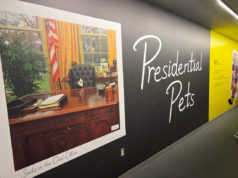Be afraid, Fort Worth. Be very afraid.
Late last year, the Fort Worth City Council decided to decrease funding for the nearly 50-year-old Arts Council of Fort Worth, a nonprofit agency that distributes funds to 45 local groups, including the Amon Carter Museum of American Art, the Kimbell Art Museum, and the Fort Worth Symphony Orchestra. The remaining $886,450 is less than half the amount allotted to the arts council as recently as five years ago. To soothe panicked arts groups, Mayor Betsy Price created a task force to take another look at arts funding.
Led by Robert Benda, CEO of Westwood Contractors, the ad hoc committee announced its recommendations on April 9 at a pre-council meeting. Some of them are inspired, but they’re all based on a questionable premise.
The city, the task force said, could offer local arts organizations several types of in-kind donations. Maybe free office space or free parking for arts patrons during events. These “freebees,” the task force said, wouldn’t cost taxpayers a dime.
The task force also said the Fort Worth Convention and Visitors Bureau could award grants to arts organizations that directly encourage tourism and that the city could create an endowment, with some city funds, to help buoy local arts organizations during shaky economic and political times.
Overall, the task force recommends raising the city’s 2014 funding level for the arts council to $1.1 million.
Getting there, though, isn’t going to be easy. Or in any way reliable. The task force wants funding for the arts to be fueled by natural gas revenues. Over the next decade, the task force says, gas revenues for the arts would increase to the point at which the city could get out of the arts-funding game altogether.
But there’s one teensy problem: What gas revenues?
Just last month, Fort Worth Weekly’s Peter Gorman wrote a cover story about the over-estimation of U.S. gas reserves (“Shale Game,” March 13), based on two scientific papers. “The vast reserves touted by Chesapeake and every other natural gas company, and echoed by state and federal government agencies, have turned out to have been either mostly hype or so inaccessible that they don’t count for practical purposes,” Gorman wrote. “In just a few years, the boom has nearly gone bust, and it is beginning to drag a lot of communities and investors down with it.”
The authors of the reports say the reserves simply are not there. And there’s another equally significant problem currently being experienced: a glut on the market, which has driven gas prices down.
An author of one of the papers, geologist David Hughes, said that many shale gas wells in the United States will run dry in 10 years or sooner. “I think the big winners in the game have already bailed, and a lot of people down the food chain are going to get burned in a few years,” Hughes told Gorman.
Scary stuff, right? Especially for the arts council, whose wagon might end up being unceremoniously hitched to this fast-burning-out star. The city council will vote on the recommendations this summer during budget negotiations.
“I am a bit unsure of the reliability and long-term sustainability of the gas-well revenue for funding of the arts,” said arts council president Jody Ulich. “I do see it as a step in the right direction, as the city seems to acknowledge that the arts should receive sustainable funding from municipal funds [and that] current funding levels are too low and not competitive.”
The arts council has been working on its own funding projects, including initiating a “united arts fund” drive (workplace giving, corporate grants, and individuals) and also identifying “untapped sources,” Ulich said.
Benda understands the instability of gas revenues but said he isn’t worried. They are “sustainable,” he said, “and much more appropriate to [arts funding] than general-fund dollars.”
One option that people clamored for but that was immediately removed from the table was tapping into Fort Worth’s Culture and Tourism Fund, a reserve fed mostly by hotel occupancy taxes. In most comparably sized cities, hotel occupancy taxes fund the arts.
Not here.
Our Culture and Tourism Fund serves only the convention and visitors bureau, the convention center, and the Will Rogers Memorial Center, the future site of a palatial equestrian arena.
“I don’t believe that there will be room in the Culture and Tourism Fund for anything but the new arena,” Ulich said. “Eventually –– could be years –– the public will catch on, the hoteliers will catch on, or they will run out of things to spend that money on. Perhaps then there will be room for the Culture and Tourism Fund to actually fund culture and tourism.”
The new arena, which will replace the badly outdated Will Rogers Coliseum (built in 1936), is a pet project of multibillionaire Fort Worth developer Ed Bass.
Fort Worth’s Culture and Tourism Fund is currently enjoying a $10 million surplus, but Benda said dipping into it “would have required reduced support to other activities critical to the economic growth of our city.”
Too bad, because arts tourism is big business in Fort Worth. Nearly 30 percent of the people who go to performances and exhibits in Fort Worth are from out of town, and most stay overnight, according to a study released in June by the advocacy agency Americans for the Arts. Presumably, our visitors are staying in hotels, not just crashing on friends’ couches.
Clearly, Fort Worth is much more Cowtown than culture. (A balance would be nice.) Fort Worth, Americans for the Arts’ study indicated, spent a measly 94 cents per capita on the arts in 2010, less than a third of the amount that Dallas spent on its arts groups in that same year. In the state, Fort Worth ranks near the bottom on per-capita arts spending.
Mayor Betsy Price is well aware of Fort Worth’s short arms and deep pockets with respect to the arts. “We don’t like other cities outdoing us,” she said at last week’s pre-council meeting. “We just need to get our financial house in order … and the [task force] recommendations will go a long way toward helping us with that.”
Good thing Fort Worth arts groups are resilient. Decreased funds “have taught us to be nimble in every way,” said Darren Woods, general director of Fort Worth Opera, whose annual festival gets under way this weekend. “We have had to change more expensive productions to less expensive ones, [and] we have omitted a performance” during the 2013 festival.
The arts council is encouraging concerned citizens to let Price and city council “know how grateful we all are for their commitment to finding funding for the arts,” Ulich said. “The funding from the gas-well revenues is a great step in the right direction –– but only one step. … We cannot continue to fall behind [other cities] and risk losing the breadth and quality of the arts in our community. If you plant the garden, you have got to keep up with it or risk losing everything.”
Freelancer Edward Brown contributed to this story.












